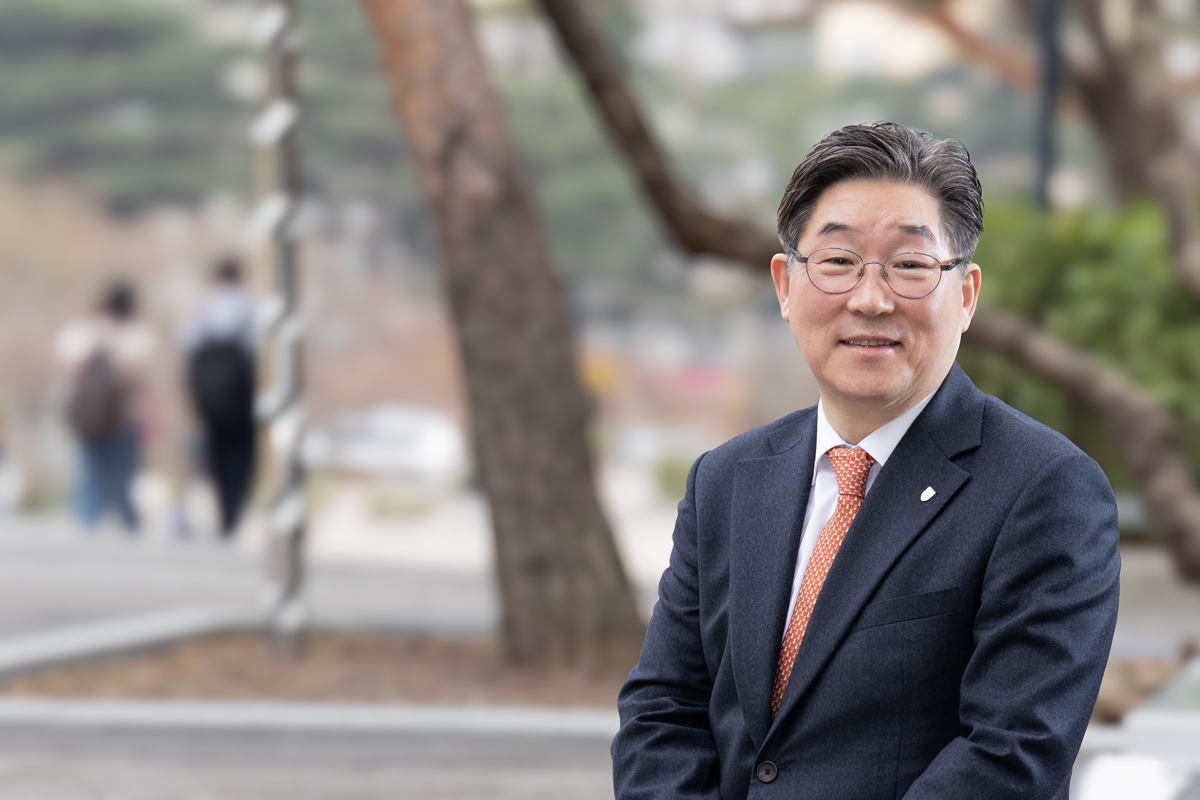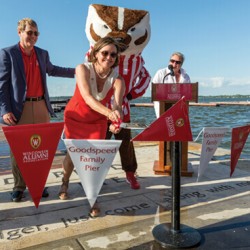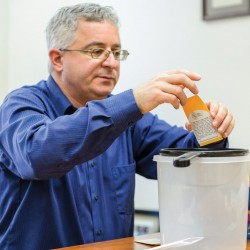Wisconsin Ideas, Korean Actions
A formative five years in Madison shaped the career of Dong-One Kim MS’91, PhD’93, who heads Korea’s leading university.
In June, Chancellor Jennifer L. Mnookin and other UW–Madison administrators will travel to Korea and Thailand to explore partnerships with alumni and leaders in academia and industry. The UW has a long history of connections with Asia, and many Badger grads hold important positions there. Dong-One Kim MS’91, PhD’93, one of the people Mnookin plans to meet, is the president of Korea University, and between 1988 and 1993, he made Madison his second home. His UW experience taught him principles that guide him as he helms one of Korea’s foremost educational institutions.
What made you decide to enroll at UW–Madison?
The home of labor relations is Wisconsin. John R. Commons was the founding father of that discipline, and he was a professor at the University of Wisconsin. There are numerous other prominent scholars in that area at the University of Wisconsin. Wisconsin also initiated many progressive labor policies like OSHA, and final offer arbitration was also started in Wisconsin. Naturally, the University of Wisconsin was the first name that appeared when I began looking at programs, followed by other schools. Second, was the living environment and Madison being very safe. So, it was the academia and the living environment that led me to choose the University of Wisconsin–Madison.
What professors did you find particularly influential?
Paula Voos was my PhD adviser. She is very pragmatic and rational. I always admired her. Ken Mericle [PhD’74] was a professor at the UW’s School for Workers. He was very considerate and cared for his students deeply. And Donald Schwab … was a strict professor who taught research methods. He always emphasized academic rigor. He was a great guy academically who made us work very hard.
You served as professor for over 25 years. Could speak about your interest in teaching and academia, and your transition to university leadership?
I was fortunate to choose industrial relations. It is a very interesting field—very philosophical and a fundamental field in social science and the relations between labor and management. I have had lots of students, especially master’s and Ph.D. students, and I was always glad to teach the subject to my students at the undergraduate and graduate levels. Labor relations is a very practical field. That’s why some past Korea University presidents thought I would be a good candidate for several important university positions. I was vice president for General Affairs of Korea University. Then I became dean of the Graduate School of Labor Studies. Then I became vice president of planning and budget. And finally, I became dean of the School of Business. After that it was very natural for many to think that I should be a candidate because of my experience. As president, I think a labor relations base is a very good fit for my job right now. University presidents have to deal with conflicts among groups and people–students, professors, parents, alumni, community, and government. My goal is managing those conflicts and ensuring we get the best solutions and outcomes. Additionally, the Wisconsin Idea is that the university should provide a practical benefit to society. I always strive to provide practical solutions, and I also set practical goals. The Wisconsin Idea should be a model for all colleges and universities.
As president of Korea University, what’s your focus?
There are actually three goals. First, Korea University has always had an important role in Korea’s history. From 1905 when Korea University was founded to 1945, students, professors, and alumni worked very hard in the movement of Korea’s independence from Japan. From 1945 until 1955 the country was shaken and then the Korean War occurred, so we had to try to rebuild the nation. Then from 1960 to the 1970s the issue was the economic development of the nation—saving people from poverty. Lots of alumni and also professors helped the country prosper during that period. After that in the 1980s and 1990s, political democratization was very important. Lots of our students and professors went to jail for the democratization movement. After the year 2000, joining the top nations in the world was an important goal for Korea, and the university helped to move the nation’s position. Now Korea is the tenth largest economy in the world. Right now, Korea University’s goal should be to contribute to the global community and the development of humankind. Our role should change from being focused on the nation to the globe. Secondly, everybody talks about the crisis of universities all over the world. I want to make a financially sound university, and I want to make Korea University a model for private universities in Korea. This includes considering how we can manage in this kind of population increase and while there is a lack of interest in university education. One solution is to make the campus truly global. Right now, around 15 percent of our students are international, from other countries. I would like to make this number 30 percent. Third, in two years we will have our 120th anniversary of Korea University. In Korean society the number 120 is very important for philosophical reasons. Twelve is the basic unit for counting numbers in the past, so ten times 12 years is significant. Also, Korea University is the oldest university in Korea, founded in 1905. I want to make the university truly global and a truly advanced university in the world. So also, in terms of software and hardware we will try to make it a top university.
What do you see as the importance of a global university?
When I attended Korea University it was very rare to go overseas, but nowadays, I think about one-third or 40 percent of students go overseas. Globalization is the trend, and you cannot reverse it. Our students will be globalized citizens. We have to teach them how to behave and how to pursue their goals in a globalized world. If we cannot globalize, our university is not going to be very competitive. We need to hire more international faculty and attract international students. Fortunately, because of the Korean Wave, there is lots of interest in Korea University.
Do you see the spirit of the Wisconsin Idea at Korea University?
Yes. I think from time to time, universities by their own logic, became isolated from the society by just pursuing intellectual play, then real problems of society cannot be addressed by universities. Wisconsin and similar universities were the beginning of the industrial university in America, really starting to research and teach practical values — agriculture, labor relations, and engineering. Many think universities are not close to society — they’re isolated; they pursue their own interests. That’s what I believe is the essence of the crisis of universities. So, we need to teach what people really want from universities. In America, the rate of high school graduates entering universities has fallen from approximately 70 percent to 60 percent. In Korea, too, we were at 80 percent, and it is decreasing every year because many believe the universities are too expensive and the courses are too long. So, we have to align our university with society. Otherwise, the crisis will only get more serious. We have to make our universities more adaptable to ever-changing societies. That mission is more important than ever now.
Published in the Summer 2024 issue




Comments
No comments posted yet.